
YOUNG ENTREPRENEURSHIP AWARD 2019

YOUNG ENTREPRENEURSHIP AWARD 2019
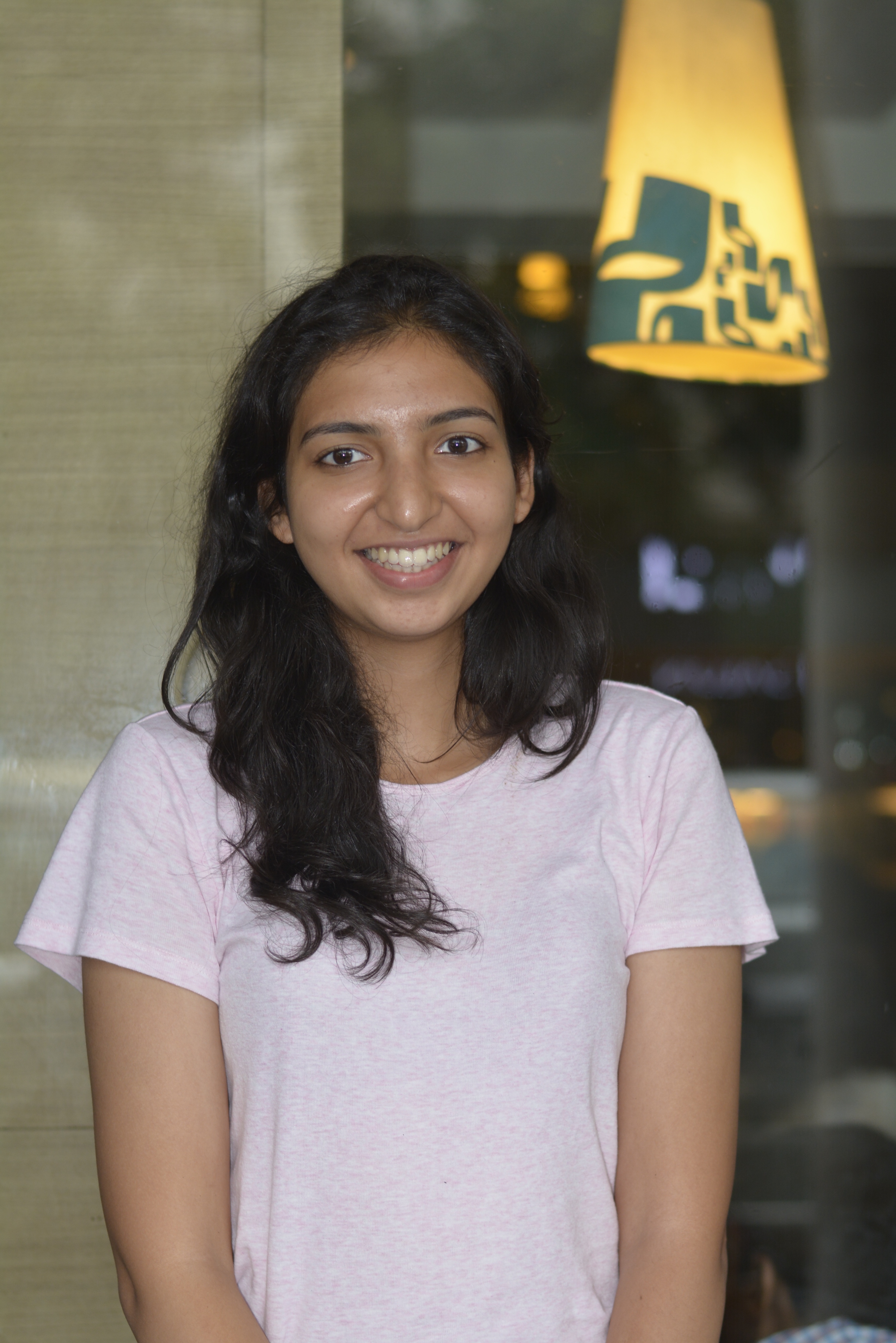 Ms. Richa Shivangi Gupta, Labhya Foundation, Co-Founder and Chief Program Officer, India
Ms. Richa Shivangi Gupta, Labhya Foundation, Co-Founder and Chief Program Officer, India
“LABHYA FOUNDATION”
In India, children who study in public schools mostly come from poor families with inadequate nourishment. Along with limited positive and stimulating exposure at home and school, they tend to lose interest in learning and have difficulty in achieving social-emotional growth. While growing up, they are severely disadvantaged due to a lack of ability for risk-taking, decision making, self-awareness and relationship management. According to a study by an American NPO, “Social Emotional Learning”, an education in controlling emotion, admitting the diversity of other people, and learning interpersonal relationships, would improve not only children’s social skills, but, also their understanding of academic subjects . Ms. Richa Shivangi Gupta founded the Labhya Foundation in 2017, and has been promoting SEL education in public schools in the Delhi area by developing an SEL Happiness curriculum. The SEL Happiness curriculum has been approved by the local government, and introduced to more than 1,000 public schools in the area where 1.2 million students and 50 thousand teachers have used it.
The Labhya Foundation also sets up innovation hubs in their partner schools, provides with teaching methods and learning materials suitable for the schools, and shares responses of children and teachers among them. The sales of teaching and learning materials at hubs account 32 % of the SEL project. The Labhya Foundation also has developed an evaluation system for the SEL project involving research firms and universities, and confirmed that positive changes in attitudes have been seen in more than 70 % of children and 90 % of teachers.
The Takeda Foundation recognizes that Labhya Foundation has made a significant contribution to the introduction of SEL education in public schools in Delie area, and gives Ms. Richa Shivangi Gupta, the Best Entrepreneur Award for her efforts of founding the Labhya Foundation and promoting SEL education. The monetary prize of the Best Entrepreneurship Award is one million yen.
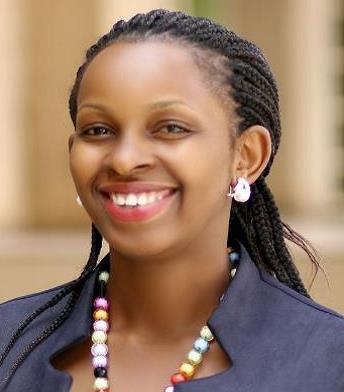 Ms. Anne K. Rweyora, Smart Havens Africa, Founder and Managing Director, Uganda
Ms. Anne K. Rweyora, Smart Havens Africa, Founder and Managing Director, Uganda
“Women and Housing in Uganda”
Like many other African countries, much of the urban population in Uganda live in unsanitary slums. They spend most of their earnings on rent and can not overcome poverty. The situation for single mothers is even worse. Ms. Rweyora lost her father when she was a child. Her relatives took her home and she was chased away from home by her own relatives. She has realized how important it is to have a home. After graduation from college, she founded Smart Havens Africa with a friend who had a similar experience, and as Managing Director, she started providing slum living women and young men with job opportunities and their own homes by constructing inexpensive houses with interlocking soil-stabilized bricks. The ingredients of the bricks are locally available sand and cement or lime, and the bricks can be produced on site by pressing the ingredients with optimum moisture. The bricks have special shapes so that they grapple together with enough strength without mortar.
Anyone who would like to build a house should take courses to learn about property and financial management provided by Smart Havens Africa. The company also offers installment payments depending on the customer’s financial situation. They offer their customers a brick producing job at a higher salary than usual so that customers can save money to build their own houses. So far, Smart Havens Africa has built 18 houses at a cost one-fifth that of the usual house construction cost.
The Takeda Foundation highly evaluates Ms. Rweyora’s efforts of providing slum living women and young men with inexpensive houses by developing interlocking soil-stabilized brick technology with local sand, and providing her customers with job opportunities, and property and financial management knowledge.
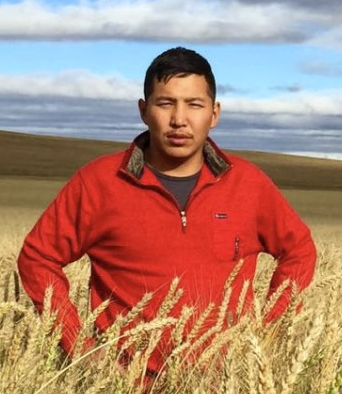 Mr. Batbold Ganbat, Hurh-Gol Farm, Founder, Mongolia
Mr. Batbold Ganbat, Hurh-Gol Farm, Founder, Mongolia
“Effective utilization of land resources”
The project is a trial for modernizing Mongolian herding by introducing a community assisted dairy farm system into Hurh village, Khentii province, Mongolia. In 1990, Mongolia adopted a market mechanism economy and people started privately owning livestock and land. This privatization has caused an increase in the number of herders and livestock, and subsequently has led to the subdivision of the herding business, causing the degradation of pasture lands. Herders traditionally keep sheep to get cash by selling Cashmere, but once-a-year sales of Cashmere do not provide enough cash. The subdivision of the herding business and lack of cash from selling Cashmere have led to the migration of herders to cities. In order to address the current problem in the herding business, Mr. Ganbat started introducing a community assisted dairy farm system by organizing community herders, introducing Piedmontese cows, and planting alfalfa and licorice on pasture lands. They also fenced pasture lands to protect soil erosion and overgrazing. In 2012, with his colleagues, Mr. Ganbat bought Hurh-Gol Farm, a formerly state owned farm, and started cultivating wheat on 2000 hectares of land. They buy Piedmontese cows with the profits gained from selling wheat. Currently, 100 herder families in Hurh village have joined the project.
The Takeda Foundation highly evaluates Mr. Ganbat’s leadership to address the current challenge in Mongolian herding by introducing the community assisted dairy system into Hurh village, Khentii province, Mongolia.
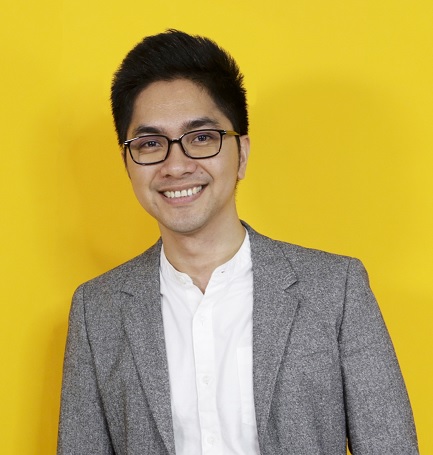 Mr. Joveth P. Mahinay, BEAGIVER Ventures, Inc., Founder and CEO、the Philippines
Mr. Joveth P. Mahinay, BEAGIVER Ventures, Inc., Founder and CEO、the Philippines
“BEAGIVER Ventures, Inc.”
Mr. Mahinay was born into a poor family, but graduated from college and succeeded in a business selling commercial bags. Based on his own experience, he believes that education plays an essential role in escaping from poverty, and has been helping children from poor families go to school since 2013. In 2017, he founded BEAGIVER Venture, Inc. to help poor families build economic bases so that they can send their children to school. The company provides poor families with sewing jobs at a salary twice that of the usual wage, and offers scholarships to their children. Mr. Mahinay also arranges school boats with an NGO, and sets up water tanks for the communities so that children do not have to fetch water from a remote water supply. He has invented a new sales system of buy-one, give-one. In this system, customers pay for two bags, and get one bag while the other bag is offered to children from poor families. The company sells not only school bags, but also commercial bags, T-shirts, and ethnic bags of the Yakan people. He also organizes a BEAGIVER Junior program to preserve the traditional weaving of the Yakan people. The company has grown to a sales of 9,500,000 pesos (ca. 188,000 US$) and has helped 65,000 children and 174 schools. The principal of a junior high school reported that the drop-out rate has decreased, and that academic achievement has improved since the company started helping children.
The Takeda Foundation highly acknowledges Mr. Mahinay’s efforts to help children go school, provide scholarships, and relieve the burdens of children fetching water by setting up water tanks in the community .
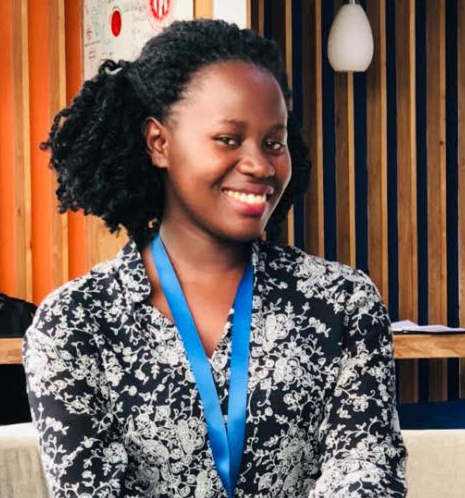 Ms. Lilian Nakigozi, Women Smiles Uganda, Founder, Uganda
Ms. Lilian Nakigozi, Women Smiles Uganda, Founder, Uganda
“Artificial Intelligence for Fistula Consultation, Diagnosis, Referral and Treatment”
This is a project offering fistula patients web consultation by AI, which provides advice so that patients can get information about fistula, receive diagnosis, and take surgery if necessary. Fistula is an abnormal connection between the vagina, rectum and bladder that develops after prolonged and obstructed labor. In Uganda, 1900 cases of fistula occur every year, and 75,000 women live with this preventable condition. Ms. Nakigozi also experienced fistula for three years, and in 2016, she founded Women Smiles Uganda to help women suffering from fistula, and developed an application program, Robinah, that allows patients web consultation on fistula by AI. Users can use Robinah on the web at 2 US dollars a month. Patients can ask Robinah any questions including about their condition and things they want to know about fistula, and Robinah will answer questions, and give advice and information depending on the situations. When Robinah discovers a need to be checked by a professional, she will advise the patient to go to a partner laboratory. The check up results will then be transferred via Robinah. She can also recommend hospitals for surgery if necessary. More than 10,000 women have been using Robinah, and 750 women have been helped to find hospitals for treatment and surgery. Women Smiles Uganda has 11 women staff, and they are also helping unemployed women become independent by providing them with vegetable garden kits that they can grow and sell. The profit in 2019 is expected to be 66,000 US dollars. They are planning to expand their activities from Africa to the world.
The Takeda Foundation highly evaluates Ms. Lilian Nakigozi’s efforts to help fistula patients who otherwise have no place to consult about their condition, and to help unemployed women become independent.
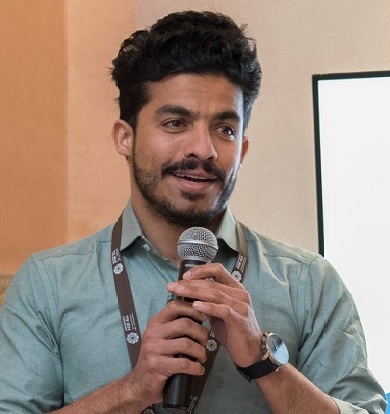 Mr. Saeed A. Alfagieh, ANAMEHANI LLC Founder and CEO, Yemen
Mr. Saeed A. Alfagieh, ANAMEHANI LLC Founder and CEO, Yemen
“ANAMEHANI”
Unemployment in the Middle East, especially in conflict areas, has been constantly increasing, and it is becoming more and more difficult for skilled workers to find proper jobs. Unemployment has now become a serious social problem in conflict areas. ANAMEHANI, which means “I am a professional” in Arabic, is an online platform that helps skilled and trustworthy workers find jobs with decent payment. It will find various handy jobs including setting up solar panels at homes and companies, electric wiring, and carpentry. Mr. Alfagieh founded ANAMEHANI in 2015, and has been providing online services to find handy jobs for skilled workers in conflict areas. Workers can access the platform from smartphones as well as personal computers. Since there are versatile workers in the area, ANAMEHANI offers various services including subscription credits, premium accounts for suppliers, and dedicated platforms for NGOs and companies. Their comparative strength includes focusing on everyday handy jobs, using pre-existing social networks, strong teamwork and a famed advisory board, strong computing systems that can handle huge volumes of transactions, and offering a reasonable fee for its services. They have expanded their service to Egypt, and moved their headquarters from Yemen to Cairo in November, 2018. They have found handy jobs for 125,000 workers with sales of 601,236 US dollars and a profit of 356,474 US dollars in 2018. The sales for 2016 and 2017 were 164,000 and 288,400 US dollars respectively.
The Takeda Foundation highly acknowledges Mr. Saeed Alfagieh’s contribution to the local economy in conflict areas by helping skilled workers find jobs, improve their skills, and increase their income.